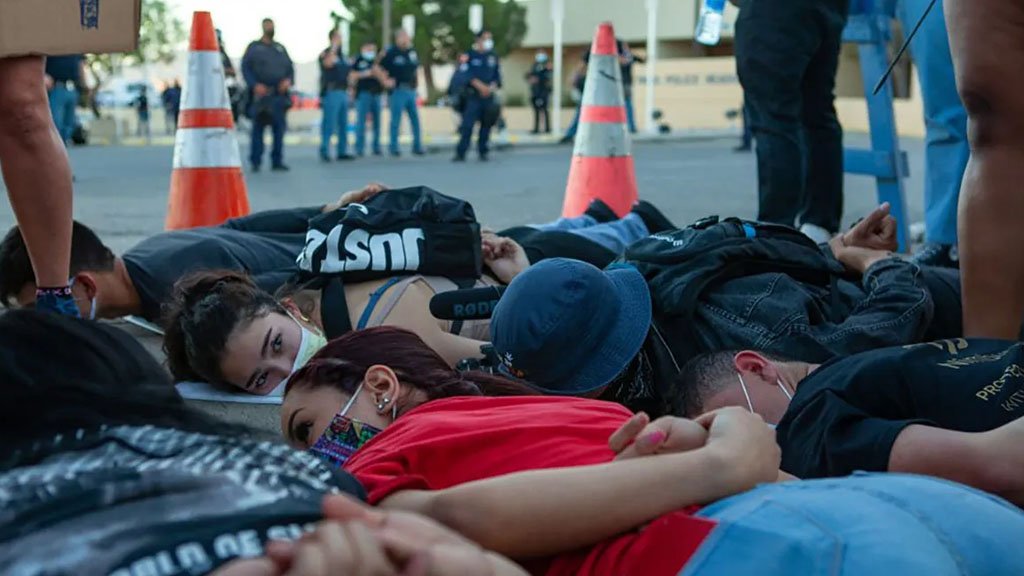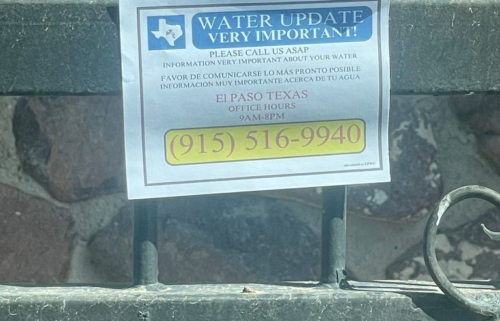Lawsuit in BLM protest spurs change to city picketing ordinance

When Emma Bowar quickly organized a protest in El Paso against police brutality toward Black Americans days after George Floyd was murdered under the knee of a then-Minneapolis police officer on May 25, 2020, she didn’t anticipate it would garner much attention.
On Friday, May 29, 2020, according to court documents, Bower posted an invitation for a peaceful protest in solidarity with the national Black Lives Matter movement in front of the El Paso Police Department Headquarters as nationwide outrage and at-times violent protests erupted throughout the country demanding police reform and defunding of police departments.
The location of the demonstration was changed to Memorial Park and was held that Sunday evening – May 31. Hundreds of demonstrators carrying pictures of Floyd and posters that read “Latinos for Black Lives Matter,” “Say His Name” and “Justice for Floyd” walked from the Central El Paso park to police headquarters about a mile away and back. It ended with El Paso police equipped with riot gear dispersing the crowd using tear gas and rubber bullets.
Bowar, who says she left the protest not long before the violence erupted, was cited by the city of El Paso on June 9 . She was charged with not having a permit to protest. A civil rights lawsuit filed in federal court on her behalf in October 2021 changed everything. The city dismissed the citation against Bowar in January because the officer could not recall the details behind the citation.
As a result of the lawsuit, however, the city is now changing its ordinance that regulates picketing – including how much notice is required to hold a protest or demonstration within the city limits and removing penalties if certain parameters are not met.
“It’s a big, big step,” said longtime El Paso civil rights attorney Fernando Chacon, who represented Bowar. “This is the way the municipal code should be written as far as First Amendment free speech is concerned.”
Aside from compensatory and punitive damages and payment of attorney fees, the lawsuit sought that the code requiring advance notice for demonstrations and marches be declared unconstitutional.
Bowar could not be reached for comment for this story. City officials declined to comment because the lawsuit is still technically open.
Chacon, who has been credited with helping to change how municipal courts punish people for traffic tickets, said he decided to challenge the constitutionality of the city’s municipal codes through Bowar’s case.
In the lawsuit, Chacon asserted that city code violates people’s civil rights because it requires a permit for a demonstration or a march be submitted in writing at least 30 days in advance, or seven days with an exception in some instances.
“They fail to consider the modern-day reality where protests are happening spontaneously in response to rapidly unfolding news or events where the seven- to 30-day notice is not practical and serves as an obstacle to the right to assemble and demonstrate peaceably,” the lawsuit states.
The lawsuit goes on to state that the city’s code is unconstitutional because it only allows for exceptions for a permit if the event is of interest to the entire city – which is determined by city officials themselves.
“It effectively stifles and/or restricts the free expression rights of the citizens,” court documents state.
Chacon said the city agreed to change its ordinance as part of a settlement. The lawsuit originally named El Paso Police Chief Greg Allen and other unnamed officers, alleging the authorization of excessive force against protestors.
Allen, who in 2016 called the Black Lives Matter movement a “radical hate group” after the fatal shooting of five police officers in Dallas,” was ultimately dropped from the lawsuit.
Since Bowar was not injured and left the protest before police dispersed the crowd, Chacon said they could not sue for monetary damages. A judge will also determine what legal fees Chacon will be paid, according to court documents.
Notification requirements, penalties to change
The City Council, during a Sept. 12 agenda review meeting, discussed the changes to the ordinance that would be introduced the following day without mentioning the lawsuit or the Black Lives Matter protests.
City Council introduced the ordinance Sept. 13, but is still making changes requested by council and has not yet scheduled the public hearing required for the second reading of the ordinance before being adopted.
Key changes to the ordinance include removing the penalty of a misdemeanor charge for not giving advance notice of a demonstration and removing the 30-day notice requirement. Prior to the changes, groups of less than 25 people were allowed to picket without notice. The council requested that part of the ordinance also be changed to ensure groups are not penalized if the number of protestors grows past 25.
Protecting the right to peacefully assemble
Fernando Garcia, executive director of the Border Network for Human Rights in El Paso, said he is all too familiar with issues that have arisen from the city’s existing ordinance.
“I was ticketed myself after an event of the border network,” Garcia said. “The next day, I had police officers and a police vehicle going to my home to deliver a ticket because of the previous day's protest.”
Garcia said the 2021 protest was quickly organized after former President Donald Trump planned a trip to the U.S.-Mexico border in the Rio Grande Valley with Texas Gov. Greg Abbott.
“We didn’t have a week to plan, and even though we didn’t have enough time, we notified police officers and hired sheriff’s officers to take care of security,” he said, adding that police didn’t cite him that day at the protest.
Garcia said he supports the changes to the city’s ordinance and maintains the restrictions should never have been in place.
“That protocol was ridiculous because we have had moments where we had to react very rapidly,” he said. “The fact that the city has this very obsolete process…it doesn’t match reality.”
Garcia is still fighting the misdemeanor citation.
Floyd was asphyxiated by a police officer who knelt on the back of his neck for more than eight minutes while being detained for allegedly attempting to buy cigarettes with a counterfeit $20 bill. The officer was convicted of murder and sentenced to 21 years in prison and is now appealing the conviction.
Within days of Floyd’s death, multiple protests were held across El Paso – with local law enforcement in riot gear present.
Diego Carlos, a Coronado High School teacher, got arrested during one of the BLM demonstrations held in Downtown El Paso on June 2.
Carlos was arrested during the demonstration when police in riot gear slammed their shields into the ground and formed a wall to herd the protestors from Mills Street toward San Antonio Avenue.
He said that at the time, he would move if police pushed him, but he would not move on his own and sat on the street when officers began moving the crowd. He said he was dragged away, handcuffed and put in a police car. He was charged with “pedestrian in the roadway” – a Class C misdemeanor.
While Carlos was not a protest organizer, he said he is glad the city is changing its ordinance and believes there still needs to be more police accountability.
“I’m glad they are doing this rule change because who's to say that something, or another unique instance might not come up and at least on paper, we have the ability to do that and not not be unfairly punished,” he said.
Carlos said he attended several impromptu demonstrations in the past where there was no police presence, or response like what occurred during the BLM protests.
His citation was dismissed after deferred adjudication, he said.
Improving police relations
Following the BLM protests and partially in response to the community’s outrage over how the El Paso police responded during the demonstration at Memorial Park, the City Council launched a task force in October 2021.
The task force aims to execute a comprehensive plan that does not mention an effort to reform the Police Department, but rather, seeks to encourage “the elimination of racial disparities and improve law enforcement interactions.”
The task force has been meeting with the community, including members of the Border Network for Human Rights to develop recommendations on how the Police Department can improve areas such as disciplinary practices and community accountability.
Garcia said the border network has been meeting with the city’s task force and will continue to meet with them to address reforms he said he thinks are necessary such as an independent disciplinary review board and an independent civilian oversight commission.
“I do believe that we have reasons to be outraged by some of the actions of the police that day (at Memorial Park) and it demanded some kind of action,” Garcia said. “What happened at Memorial Park – it has not been an isolated incident.”
This article first appeared on El Paso Matters and is republished here under a Creative Commons license.![]()


